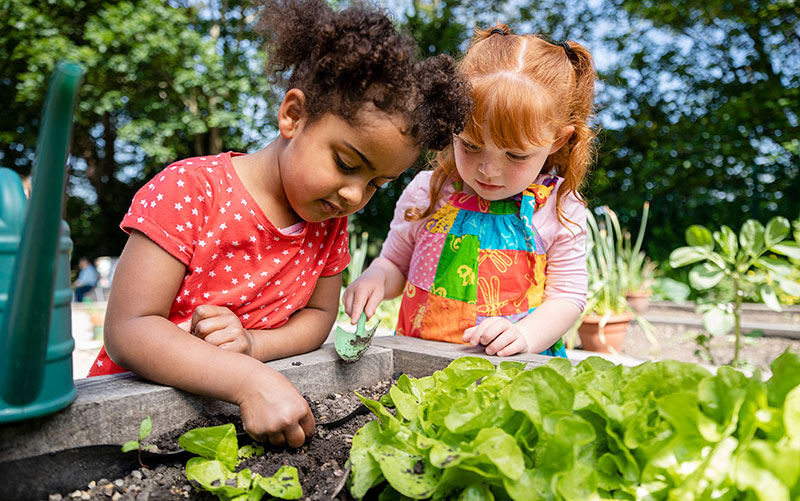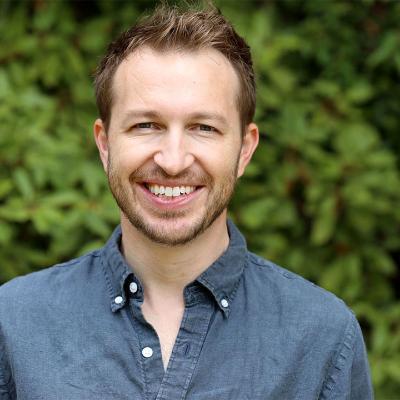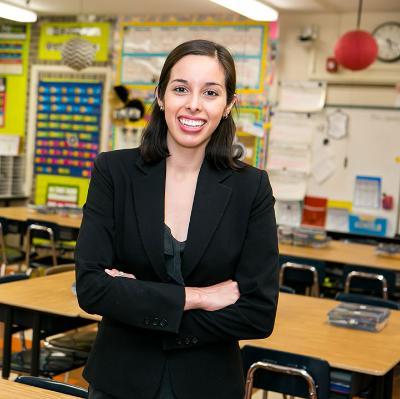
Nick Melvoin, M.A. ’10 devoted his career to promoting the interests of Los Angeles schoolchildren as a teacher and advocate before his election to the Los Angeles Unified School District (LAUSD) Board of Education in 2017. Now, as the board’s vice president, the LMU School of Education alum is at the forefront of an effort to combat the negative impacts of climate change on the district’s children, transforming LAUSD playgrounds from asphalt-dominated heat absorbers to greener, shadier spaces more conducive to learning, wellness, and mental health.
Studies have shown that green spaces on or around school campuses contribute to better physical and mental health for students, along with improved academic performance. But only 16 percent of LAUSD schools currently meet the 30 percent standard passed by the board. In a September 16, 2022 Los Angeles Times op-ed during a record-breaking heat wave in the city, Melvoin pointed to research that found asphalt temperatures in the San Fernando Valley soared to 145 degrees. As the effects of climate change intensify, he said, the government must respond more effectively—and schools must do their part.
Among his key allies in this initiative is a fellow SOE graduate, Board President Kelly Gonez, M.A. ’13. Gonez recently authored a resolution, passed unanimously by the board in September 2022, that establishes a minimum standard of 30 percent green space on all LAUSD campuses by 2035. It calls on district officials to identify bond, general fund, and grant dollars that can be used to fund the green space expansion by the deadline. “Today’s resolution reaffirms the district-wide priority to find innovative and collaborative greening solutions for our school communities,” Melvoin said in a statement released the day of the resolution’s passage. “Every student, school, and community should have access to green space, and I’m proud of our ongoing efforts to provide outdoor learning spaces, campus gardens, school community parks, and campus shade.”

These solutions for climate change also help to address equity concerns. Higher-income neighborhoods tend to have more trees and cooler campuses; the Green Index compiled by LAUSD has found that some elementary schools have less than one percent of green space on their grounds. The board’s resolution prioritizes taking action at schools with the highest percentage of asphalt, and in communities most affected by extreme heat and climate change.
“As we confront climate change, our students are more in need of shaded green spaces than ever before,” Gonez said in a statement upon the resolution’s passage. “For decades our school district has built playgrounds almost entirely of asphalt with no shade cover, which only exacerbates extreme heat. Today, we are committing to transforming our campuses by bringing tree canopies, plants, and outdoor learning spaces for all our students to learn and play. By establishing a clear goal and timeline to make our campuses greener, we are invigorating new urgency, accountability, and energy to this cause to ensure every school offers the shade and greenery that our kids deserve.”
For both Gonez and Melvoin, the push to greenify LAUSD is consistent with the social justice-oriented emphasis of their SOE education — recognizing that schools represent critical venues for enacting policies that address societal issues, such as the climate crisis, that profoundly impact schoolchildren and their families.

Melvoin, who began his career as an English teacher at Markham Middle School, an LAUSD campus in Watts, holds a law degree from NYU and a Masters in Urban Education from LMU, where he also served as an adjunct professor and taught a course on education law. In addition to his stint as a teacher, he has worked in the Obama White House with the Domestic Policy Council and the U.S. Attorney’s office, where he took part in various civil rights investigations. He has led and facilitated efforts by students, parents, teachers and community members to rethink and shape the future of Los Angeles schools.
In his Los Angeles Times op-ed, Melvoin emphasized the urgency of addressing the growing threat posed by the escalating climate crisis. “LAUSD is also working on longer-term efforts to cool campuses, including planting more trees that will provide canopy shade, replacing asphalt with green space and building more shade structures in compliance with current standards,” he wrote. “But none of this will happen overnight and our students need relief from the heat now.”